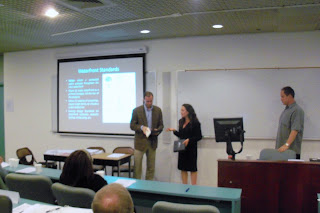The point of the real estate class that I teach is to link you with practical information and empower you to obtain real estate related jobs. See the paid job below offered by the Florida Department of Business and Professional Regulation, Regulation. If you are interested, follow the instructions on how to apply. This is an important job and a good way to get your foot in the door. One of our most interesting Guest Lecturers, Brian Piper, the Investigative Manager for South Florida for the Department of Business and Professional Regulation is offering the position.
The State of Florida is an Equal Opportunity Employer/Affirmative Action
Employer and does not tolerate discrimination or violence in the
workplace.
Applicants requiring a reasonable accommodation, as defined by the
Americans with Disabilities Act, must notify the agency hiring authority
and/or the People First Service Center (1-877-562-7287). Notification to
the hiring authority must be made in advance to allow sufficient time to
provide the accommodation.
The State of Florida supports a Drug-Free workplace. All employees are
subject to reasonable suspicion drug testing in accordance with Section
112.0455, F.S., Drug-Free Workplace Act.
OPS Investigation Specialist I
POS#: 79900594
Hiring Salary: $14.00 per hour
The hiring salary of this position is anticipated to be $14.00 per hour with no benefits provided.
DESCRIPTION:
The work of this position is to investigate complaints of alleged violations of Florida Statutes and Commission and Board Rules involving the Real Estate professions under the jurisdiction of the Department of Business and Professional Regulation.
Incumbent investigates complaints of alleged violations of Florida Statutes (Chapters 455 and 475), Florida Administrative Code (61J1 and 61J2) and the Uniform Standards of Professional Appraisal Practice (USPAP) involving the real estate professionals under the jurisdiction of the Division of Real Estate. Interviews complainants, subjects, and appropriate witnesses. Reviews court records and other essential documents, collects corroborative evidence, conducts inspections, prepares and serves subpoenas and administrative complaints, prepares and serves notices to cease and desist, notices of noncompliance, and citations. Prepares comprehensive reports of final and supplemental investigations.
Maintains a working relationship with other governmental agencies and other divisions within the Department of Business and Professional Regulation. Attends probable cause and administrative hearings as required. Builds and maintains collaborative networks with local authorities and professional organizations. Refers cases to appropriate external partners as directed.
May be required to testify at criminal, civil and administrative hearings and depositions.
REQUIREMENTS:
Must be able to prioritize work to meet deadlines and have the ability to communicate effectively orally and in writing. Must be computer literate in the use of Microsoft Word, Excel and Outlook. Within one year of employment the incumbent must be proficient working with the agency's licensing database and document management system.
This position requires a security background check.
Note: You may be required to provide your Social Security Number (SSN) and date of birth in order to conduct this background check.
Applicants are required to apply through the People First system by the closing date, by either applying online or faxing a completed application to the People First Service Center to 1-888-403-2110. All required documentation must be received by the closing date of the advertisement. If you have any questions regarding your application, you may call 1-877-562-7287.
** All responses provided to the qualifying questions for this vacancy advertisement must be verifiable on your State of Florida, Employment Application. **
Applicant Note: If you are the selected candidate for this position and hold a current license through the Florida Department of Business and Professional Regulation, you may be required to place your license in an inactive status.
Employer and does not tolerate discrimination or violence in the
workplace.
Applicants requiring a reasonable accommodation, as defined by the
Americans with Disabilities Act, must notify the agency hiring authority
and/or the People First Service Center (1-877-562-7287). Notification to
the hiring authority must be made in advance to allow sufficient time to
provide the accommodation.
The State of Florida supports a Drug-Free workplace. All employees are
subject to reasonable suspicion drug testing in accordance with Section
112.0455, F.S., Drug-Free Workplace Act.














